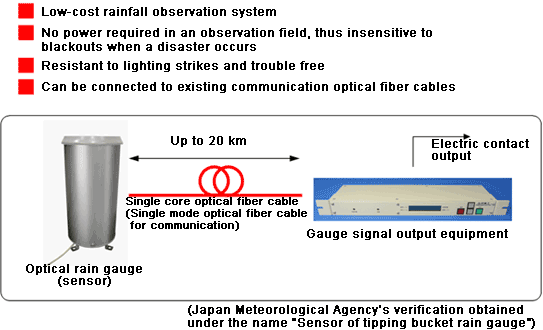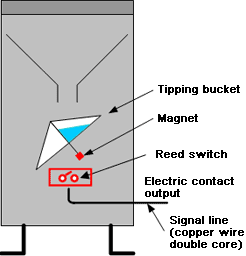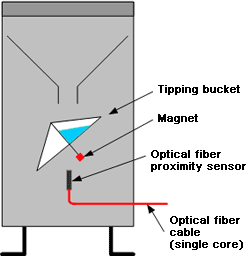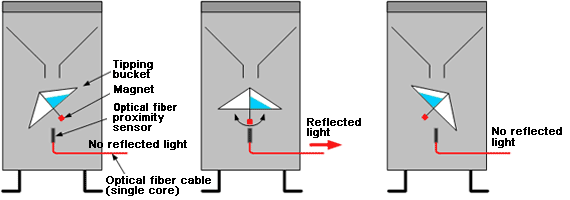December 7, 2011
Komatsu Factory Co., Ltd. (Head office: Meguro-ku, Tokyo; Representative: Daiichiro Komatsu), a manufacturer of meteorological equipment, and Furukawa Electric Co., Ltd. have jointly commercialized an optical fiber rain gauge, obtained the Japan Meteorological Agency's verification(Figure 1) and launched sales.
Using a disaster-resistant optical fiber sensor, the optical fiber rain gauge comes in handy when undertaking measures against flooding and inundation caused by the recent pluvial climate and local heavy rains, disaster measures such as evacuation orders issued to residents and support for traffic control, etc.
Background
Because of the tendency toward a pluvial climate in this Japan, heavy rains and flooding have been increasing. There are growing needs to raise the density of rain gauges to be installed and to gain more accurate rainfall information as measures against the local intermittent heavy rains. When installing rain gauges on mountains, in urban areas and on roads, aside from the rain gauge sensor, numerous amounts of incidental facilities and devices were normally necessary, such as a device called a rain gauge converter for activating the rain gauge, wireless/wired devices to transmit the information obtained by the rain gauges, power equipment that needs to lead the distribution lines and lightning arresters to protect the equipment from lightning strikes. It was also necessary to construct outdoor storage boxes to accommodate all these devices and facilities and to conduct installation and electrical work.
Mechanism of the optical fiber rain gauge
The sensor of the optical fiber rain gauge uses the same mechanism as the conventionally used tipping bucket rain gauge, which outputs an optical pulse when the tipping bucket operates. The sensor of a conventional rain gauge records rainfall of 1 mm when the electric contact of the reed switch closes as the magnet passes over the reed switch while the tipping bucket operates(Figure 2). Instead of a reed switch, the sensor of the optical fiber rain gauge uses an optical fiber proximity sensor(Figure 3), which generates reflected light when the magnet passes over the sensor(Figure 4). By connecting a device known as "gauge signal output equipment," in which a light source and a light-receiving device are incorporated, to the sensor of the optical rain gauge through single core optical fiber cable, it is possible to observe rainfall remotely from a distance of up to 20km(Figure 1).
Characteristics of the optical fiber rain gauge
With its built-in optical fiber sensor made of glass, the optical rain gauge sensor requires no power, thus allowing the construction of a rain observation system by simply connecting the sensor to the optical fiber cables in the observation field, as long as the optical fiber cables have been installed in rivers, roads and railways and the local government has installed the communication fibers consisting of optical fiber cables for the informatization of the region. As mentioned above, the optical fiber rain gauge eliminates the need for the incidental facilities that were required with the conventional rain gauge, thus reducing installation costs. It also allows the construction of a rain gauge system that is resistant to lightning strikes and is trouble free, as it needs no instruments equipped with electronic devices in the observation field and thus reduces maintenance costs. It is also insensitive to the blackouts that tend to occur when a disaster strikes, as it needs no power in the observation field.
Employing a disaster-resistant optical fiber sensor, the optical fiber rain gauge comes in handy when undertaking measures against the flooding and inundation caused by the recent pluvial climate and local heavy rains, disaster measures such as evacuation orders issued to residents and support for traffic control, etc. The optical fiber rain gauge is also the first optical fiber sensor in the industry to obtain the Japan Meteorological Agency's verification.



